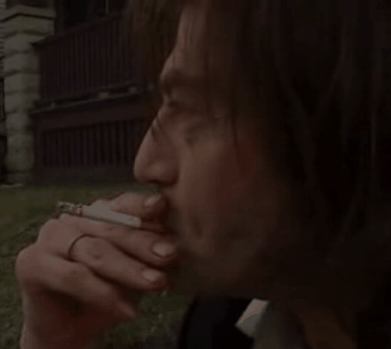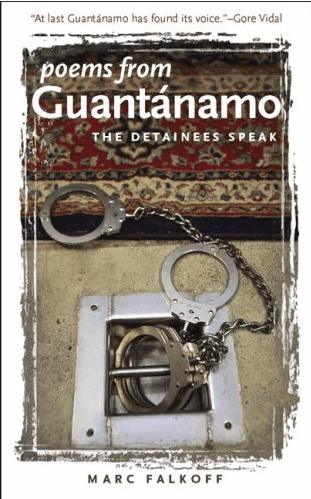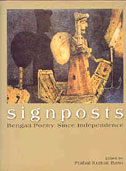 An international poetry book review series
An international poetry book review series
Series Editor:: Aryanil Mukherjee
|
Poems from Guantánamo
The Detainees Speak
Edited by Marc Falkoff
Non-Poetry for Non-Readers
(towards a non-reading American abolition of "non-literatures"
-an entry in the Annals of the New Extreme Experimental Poetry)
David Baptiste Chirot
"The blank and ruin we see in Nature is within our own eye."
--R.W. Emerson, "Nature"
Isolation is the condition from which and into which the Guantanamo poets and poems emerge and become re-confined. The book of poems is treated as an "isolated" event, outside of the forms of critique and reading that constitute a "normalized" poetry's "reception." The circumstances of the poets, the Pentagon supervision of censorships, legal translators, "stand in the way" of the poems finding a context in which to be read as more than one more addition to the shelves of "prison poetry." "Put off to the side," it is hoped they may quickly "go unread" rather than participate in a questioning of the War on Terror and American language and writing's responses—or lack of them—to the Global conflict.
The poems, however, are not "an isolated event" at all, but integrally "bound" to the ongoing contexts of the Invasions of Afghanistan, Iraq and the unbounded Global War on Terror. Their language needs to be read in relation with the writing which was and is used in the construction and maintenance of the GWAT and Homeland Security. This is a language "already written" and at the same time as yet unrecognized as an American writing, one by which an isolated and isolationist America paradoxically becomes part of a world it "crusades" to have no part of. By examining this unrecognized language in terms of its various manifestations as both "documents" and "fictions," what emerges is a "New" Extreme American Poetry of which the Guantanamo Poems are very much a part.
"'As usual,' says Pasolini, 'the only symptoms we had to go on were in the language.'" In The Moro Affair, Leonardo Sciascia makes use of Pasolini's example in examining the texts generated by the 1978 kidnapping and execution by the Red Brigades of the Italian premier Aldo Moro. By examining the language of Moro's letters, Sciascia "develops," as from a negative, the realization by Moro of the full "exposure" of Power "hidden in plain sight." Paradoxically hidden in plain sight, for Moro himself is hidden in plain sight, both physically, and through his uses of language, in which he essays to "reveal his location" and his desire to be freed through an exchange for Leftist Prisoners.
Inevitably, the longer his words seem to remain obscure, the more they show themselves becoming aware that those looking for him are only going through the motions. It is not the Red Brigade which wants his execution, but his own Party, his own friends. At first writing from a presumed position of solidarity, Moro's language finds its way to his true condition, that of isolation:
He was obliged to express himself in a language of non-expression, to make himself understood by the same means he had sought and tested to in order not to be understood. He had to communicate through the language of non-communication. Out of necessity. That is through censorship and self-censorship. As a prisoner. As a spy in enemy territory and under enemy supervision.
With the Guantanamo Poems, as Flagg Miller suggests in his excellent preface, it is not only censorship which is involved, but a self-censorship on the part of the poets. While the military plays its part as censor, the poets "of necessity" are forced to counter with a self-censorship which may make it possible "to communicate through the language of non-communication" which may pass the censor. Seeking to expunge every sign of "poetry" as carrying a perhaps concealed message, the censors force the detainees to choose "non-poetry" which communicates the existence of a "real poetry" which is not allowed to show itself. As Sciascia notes: ". . . obliged to express himself in a language of non-expression," the poet must "make himself understood by the same means he had sought and tested in order not to be understood."
The great majority of reviewers, even when sympathetic to the plight of the poets, express the finding that the "poems" are not "poetry." Even giving the poets a "break" for writing in traditions foreign to Americans, and their being translated by non-literary translators, most critics agree there is "no poetry here." For a number of these critics, the "real poet" responsible for this non-poetry is the Pentagon. This in effect, cancels out the meaning of the poems' publication. Ultimately, it may be –and has been--regarded as a "protest" not to even read the poems.
Sciascia's reading of Moro's letters suggests however that the very existence of poetry is possible in the poems' language of non-poetry. This is because the poet is forced to write a "language of non-expression," (a non-poetry), in order to "make himself understood by the same means he had sought and tested in order not to be understood."
The words "sought and tested" indicate that a language has been chosen through "experiment" and "experience" for its effectiveness as a "non-expression" "in order not to be understood." Consider the poets' situation in its relationship to censorship. The isolation, torture and strict control of every aspect of the detainees' existence and language is not meant to "silence" them, but to FORCE THEM TO SPEAK. If one is being forced to speak, the sole means of resistance is to speak so as not to be understood, to communicate via "non-expression."
Forced to speak, the detainee seems to the torturers, guards and Pentagon supervisors, to be doing exactly what is demanded of him. Yet, forced to speak, the detainee must find a way to do so without being" understood," and at the same time produce a "non-expression" which is on the surface "acceptable" and "understood" by the torturers.
This "sought and tested" non-expression that is not understood is what is the "real poetry" of the detainees, and why it is not recognized when it appears.
Since one of the military's greatest fears is that poetry by its poetical means as poetry possesses a built-in capacity for the smuggling out of concealed messages, only the most non-poetical non-poetry will be allowed to be released to the American non-reader of even the most insidiously "poetically" concealed conceits.
In the late Chilean exile Roberto Bolano's novella Distant Star (itself an extension of the last chapter in Nazi Literatures of the Americas), the poet narrator is enlisted by a former Chilean detective who had been honored by Allende and imprisoned three years under Pinochet, to help track down and kill the enigmatic Carlos Wieder aka Juan Ruiz-Tagles, among a long series of pseudonyms Wieder had for a while been a "Distant Star" in the Chilean horizon, the creator of a New Chilean Poetry which runs the gamut of what has become the New Extreme American Poetry of 9/11's hi-jacked planes, the atrocity images of Abu Ghraib and the use of plagiarized, forged, and distranslated texts in creating the "evidence" making it "absolutely necessary" to invade and occupy Iraq before it "was too late."
While a Lieutenant in the Chilean Air Force, the underground avant-garde poet turned aviation hero created the first exhibition of the new Chilean Poetry. After a performance of sky writing during an ominous storm, selected guests are invited to attend a soiree given by the poet-hero. One at a time at first, the guests enter a room into which they are locked with walls and ceiling covered by photographs of the victims of torture, many posed in a dismembered state in front of the same anonymous backgrounds. A few of the victims, horribly disfigured, even seem to be still living. Among them are a number of "missing" young female poets. Forced to leave the Air Force, Welder's poetry, plays, essays and photographs of his aerial feats are forced to go "underground," appearing under a bewildering array of pseudonyms in extreme Right Wing publications ranging from biker zines to opulently produced but clandestine journals. Eventually Wieder vanishes from the "Nazi Literatures of the Americas" and resurfaces among an equally extreme and strange variety of publications from many of the European countries. He appears, though unseen, as a second cameraman, to be connected with the unsolved murders of an Italian porn film company's actors and technicians. He also appears at one point as Jules Defoe, amalgam of the two great authors of fictional "travel literatures," (Jules Verne and Daniel Defoe), whose works in themselves were amalgams of fact, fiction, and science fiction. Defoe appears, once as essayist, once as poet, in two organ of the French "school of barbaric writing," founded during May 1968 in Paris by a former legionnaire.
Barbaric writing itself is born of a "trial by fire" not unlike a self imposed torture session in which the participants are the writer-to-be and the texts of great literature. The barbaric writer is to lock him or herself in a room or apartment, singly or in small groups, and spend a week tearing apart, destroying, books by great authors and shitting, pissing, masturbating, spilling blood on the pages, to roll among them and so to become "immersed" in writing. Emerging from this baptism, the newly born barbaric writer then proceeds to contribute to its underground journals distributed via public book fairs and stalls. The barbaric writers are drawn from the working class, and in one journal, under the rubric "Profession: Amateur," Their photos are police file passport style images, at once "identifying" and strangely anonymous. They are the opposite, notes the poet narrator, of what are considered to be "professional" "author's photos." The notorious Wieder-Jules Defoe, who has become a Latin American cult figure frequently sought after and as yet undetected despite swirling rumors of his presence and activities around the globe, does not appear among them.
In a jerky and ferocious style, {Defoe's} essay argued that literature should be written by non-literary people, just as politics should be and indeed was being taken over by non-politicians, as (Defoe) was delighted to observe. The corresponding revolution in writing, Defoe went on to say, would, in a sense, abolish literature itself. When poetry is written by non-poets and read by non-readers.
Another way of thinking of this is that the poems express a refusal to be forced into giving "good" poetry to the torturers. When Robert Pinsky remarks that there are "no Mandelstams here," a remark repeated by several others—with a mixed sense of relief and triumph--might this not be a refusal to provide a Mandelstam to the Americans?
Give the Americans what they really want—no Mandelstams, no "great poetry" to be produced by their Gulag/ Guantanamo. Treat me like a nothing—and I will give you nothing. For it is you, "hypocrite reader, mon semblable, mon frere" who is a nothing and will receive the nothing you deserve. In this case it is not the poets who are producing a non-poetry, but their American readers. Ironically, reading the poems as "bad poetry" in a sense hides the real poetry of the refusal. What stares back at the reader is the "non-poetry" of his own inability to read the poetry's refusal.
In the words of Ralph Waldo Emerson in the "groundbreaking" essay "Nature":
"The blank and ruin we see in Nature is within our own eye."
The "blank and ruin" of the Poems from Guantanamo is in the American reader's own eye--A "blank and ruin" which is projected outward from this eye so that the world it sees becomes a mirror of its own eye. Rather than experiencing being a "Transparent Eyeball" as Emerson did, the contemporary American vision is imprisoned in a blank and ruin which is its own mirror image.
And in order to keep isolate this mirroring vision, to use it as the basis for both Homeland Security and the Spreading of Freedom—the mirrored "blank and ruin" imprisoning the contemporary American reader's own eye arrives at "Defoe's" formulation: In a jerky and ferocious style, {Defoe's} essay argued that literature should be written by non-literary people, just as politics should be and indeed was being taken over by non-politicians, as (Defoe) was delighted to observe. A revolution in writing, Defoe went on to say, that would, in a sense, abolish literature itself. When poetry is written by non-poets and read by non-readers.


|
David Baptiste Chirot is an amazing litterateur, artist, reader and critic. Born in Lafayette, Indiana, he grew up in Vermont and also lived in Gottingen, Germany, Arles & Paris, France, Wroclaw, Poland, Hastveda, Sweden, Boston and Milwaukee. Since 1997, Chirot has contributed essays, visual & sound poetry, performance scores, prose poetry, poetry and book reviews in 70+ different print and online journals in USA, Brazil, England, Spain, France, Germany, Russia, Chile, Australia, Yugoslavia, Italy, Canada, Argentina, Mexico, Cuba, Turkey, Japan, Holland, Belgium, Uruguay and India.
|
|
|
BOOKS
|

Poems from Guantánamo
The Detainees Speak |
|

SIGNPOSTS
A Bengali Poetry Collection |
|
|




